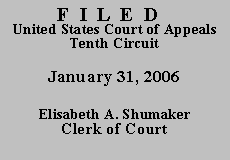

| ROOT WEST,
Plaintiff-Appellant, v. JO ANNE B. BARNHART, Commissioner of Social Security, Defendant-Appellee. |
|
Plaintiff-Appellant Root West appeals from the order entered by the district court affirming the Social Security Commissioner's decision denying his applications for disability insurance benefits and supplemental security income (SSI) benefits under the Social Security Act. Exercising jurisdiction under
42 U.S.C. § 405(g) and 28 U.S.C. § 1291, we affirm.
Plaintiff alleges that he has been unable to work since March 1987 due to a combination of physical and mental impairments. Specifically, plaintiff alleges that he "suffers from the effects of a lower back injury, cardiac abnormalities, double hernia, and psychological disturbance." Appellant's Opening Br. at 3. In a decision dated February 26, 2004, the administrative law judge (ALJ) found that plaintiff "does not meet the requirement for entitlement to Title II [disability insurance] benefits, as he does not have a severe impairment prior to December 31, 1993, the date last insured." Appellee's App. at 33. In the briefs he submitted to the district court, plaintiff did not challenge the ALJ's denial of his Title II application, and he has likewise not challenged that denial in this appeal.(1) As a result, for purposes of this appeal, we will consider only plaintiff's application for SSI benefits under Title XVI of the Social Security Act. To be entitled to SSI benefits, plaintiff must show that he was disabled between September 26, 2002, the date he filed his application for SSI benefits, id. at 24, and February 26, 2004, the date of the ALJ's decision, see 20 C.F.R. §§ 416.330, 416.335, and 416.1476(b)(1).
For purposes of plaintiff's application for SSI benefits, the ALJ found that plaintiff has suffered from degenerative disc disease of the lumbar and cervical spine since the date of his application for SSI benefits, and the ALJ determined at step two of the five-step sequential evaluation process for determining disability that these conditions are severe impairments. The ALJ found, however, that plaintiff's alleged mental impairment and heart problems were not severe impairments. In addition, the ALJ found at step four of the evaluation process that: (1) plaintiff's "testimony concerning his impairments [was] not fully credible," Appellee's App. at 31; and (2) plaintiff had "the residual functional capacity to perform a full range of light work," id. at 32. The ALJ then denied plaintiff's application for SSI benefits at step five of the evaluation process, concluding that there are a significant number of jobs in the national economy involving light work that plaintiff can perform.
In July 2004, the Appeals Council denied plaintiff's request for review of the ALJ's decision. Plaintiff then filed a complaint in the district court. In
May 2005, after receiving briefs from both sides and holding oral argument, the district court entered an amended order and memorandum of decision and a related judgment affirming the denial of plaintiff's applications for benefits. This appeal followed.
Because the Appeals Council denied review, the ALJ's decision is the Commissioner's final decision for purposes of this appeal. See Doyal v. Barnhart, 331 F.3d 758, 759 (10th Cir. 2003). In reviewing the ALJ's decision, "we neither reweigh the evidence nor substitute our judgment for that of the agency." Casias v. Sec'y of Health & Human Servs., 933 F.2d 799, 800 (10th Cir. 1991). Instead, we review the ALJ's decision only to determine whether the correct legal standards were applied and whether the factual findings are supported by substantial evidence in the record. See Doyal, 331 F.3d at 760.
In this appeal, plaintiff has raised the same issues that he raised in the district court. First, plaintiff claims the ALJ erred in finding that he lacked credibility. In particular, plaintiff challenges the ALJ's reliance on his medical treatment history and daily activities, arguing that his sparse treatment history and extensive daily activities do not support a negative credibility finding. Second, plaintiff argues the ALJ erred by ignoring the medical evidence showing that he suffers from a double groin hernia. Lastly, plaintiff argues the ALJ erred by not fully incorporating the medical evidence showing that he suffers from a psychological impairment.
Plaintiff's arguments are without merit. In its well-reasoned amended order and memorandum of decision, the district court thoroughly analyzed each of plaintiff's claims using the same standard of review that governs our review, see Appellant's App. at 10-11, and we find the district court's analysis and conclusions to be persuasive on each point, id. at 13-17. Accordingly, we see no reason to repeat the district court's analysis, and we affirm for substantially the same reasons set forth in the district court's amended order and memorandum of decision.
The judgment of the district court is AFFIRMED.
Entered for the Court
Circuit Judge
*. This order and judgment is not binding precedent, except under the doctrines of law of the case, res judicata, and collateral estoppel. The court generally disfavors the citation of orders and judgments; nevertheless, an order and judgment may be cited under the terms and conditions of 10th Cir. R. 36.3.
1. In the briefs he submitted to the district court, plaintiff requested only that he be awarded SSI benefits. See D. Ct. R., Doc. 10 at 4 and Doc. 12 at 4.